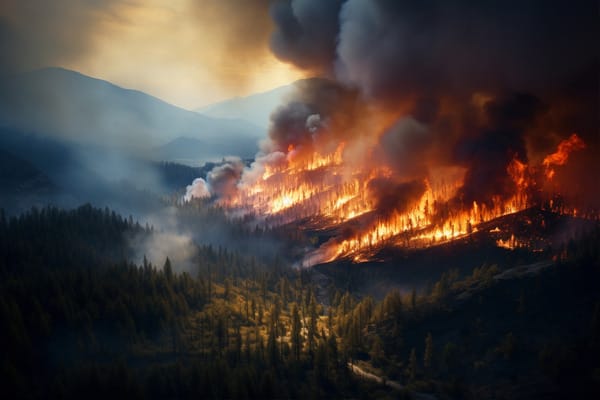A massive wildfire near Marseille has thrown one of France’s most vital tourism corridors into chaos, suspending hundreds of flights, displacing thousands of visitors, and sending traveler sentiment plummeting during the height of the Mediterranean summer season.
The blaze, which has already burned over 720 hectares, injured more than 100 people, and forced emergency evacuations across the Provence-Alpes-Côte d’Azur region, has exposed serious vulnerabilities in France’s tourism infrastructure amid intensifying climate-related disasters.
The Marseille-Provence Airport, France’s second busiest hub, was partially shut between July 8 and 9, impacting over 282 scheduled flights and stranding more than 45,000 passengers, both domestic and international. The disruption comes at a critical time, just as the region welcomed peak summer tourists for holidays, festivals, and beach escapes.
Tourism Hit as Flights Halted, Roads Closed, and Evacuations Ordered
According to France’s Ministry for Ecological Transition, the wildfire was fueled by extreme heat, dry winds, and parched vegetation. With temperatures nearing 40°C, regional authorities implemented red alerts for fire danger, prompting evacuation orders in the Marseille suburbs and surrounding hillside towns.
Key road and rail links to Marseille were also disrupted, with traffic diverted from parts of the A55 motorway, and rail services to Aix-en-Provence and Toulon experiencing delays and cancellations. Tourists arriving at the Marseille-Provence Airport found themselves rerouted to Nice, Lyon, or even Paris, causing missed hotel reservations, cancelled excursions, and a sharp drop in regional visitor spending.
Marseille Summer Travel Season Devastated
July marks the beginning of peak season along the French Riviera, drawing millions of international visitors to cities like Marseille, Nice, Cannes, and Avignon. However, the wildfire has led to mass cancellations, with local tourism boards confirming that hotels, tour agencies, and restaurants have seen a noticeable drop in bookings.
The fire also cast doubt on the region’s preparedness for extreme weather. Emergency response systems, although prompt, have been stretched thin, while tourist guidance and evacuation protocols remain inconsistent across hospitality providers.
Travel Sentiment Plunges Amid Ongoing Climate Concerns
According to Mabrian Technologies, a travel intelligence platform under The Data Appeal Company – Almawave Group, Marseille’s travel sentiment metrics have dramatically declined in just one week.
- The Perception of Climate Index (PCI), which reflects tourists’ views on environmental conditions, fell 36.4% year-on-year to just 61.6/100—a clear sign that extreme weather is influencing travel decisions.
- The Perception of Security Index (PSI) also dropped to 77.1 points, a 5.1% year-over-year decline, and down more than 17 points since July 1—a direct response to the perceived safety risks created by wildfires and lack of emergency clarity.
These sentiment scores are used by destination management organizations (DMOs) and tourism ministries to track potential dips in visitor confidence, bookings, and expenditure. In Marseille’s case, the figures suggest long-term consequences for the region’s reputation as a reliable summer destination.
France’s Broader Tourism Sector Faces Climate Reckoning
The wildfire crisis around Marseille is part of a larger trend impacting Southern Europe, where climate volatility—including heatwaves, wildfires, droughts, and infrastructure failures—is disrupting traditional tourism patterns.
In 2023 and 2024, similar wildfires affected Greece, Spain, and Portugal, resulting in cancelled cruises, diverted flights, and lowered tourism revenues. The European Commission has acknowledged the growing threat climate poses to seasonal tourism and is pushing for greater integration of climate risk adaptation plans in destination strategies.
Tourism experts warn that unless cities like Marseille invest in climate-resilient tourism frameworks, their ability to sustain high summer demand could rapidly decline in the years ahead.
Urgent Need for Preparedness and Communication
Local authorities and tourism stakeholders are now urged to act swiftly to manage public messaging, restore traveler trust, and support affected businesses. Clear communication of safety procedures, real-time weather alerts, and contingency planning are all essential to minimize future economic shocks.
“Tourism boards must now prioritize climate resilience just as much as promotion,” said Jean-Luc Reynaud, a tourism risk management consultant. “Visitors today are highly sensitive to environmental disruptions and demand transparency, preparation, and protection.”
What Travelers Should Do Now
If you are planning or currently on holiday in the Marseille-Provence region, officials advise the following:
- Check flight status with your airline before heading to the airport.
- Monitor official wildfire updates via the Ministère de l’Intérieur and Météo-France.
- Follow evacuation instructions if staying near affected zones.
- Consider rerouting travel to unaffected areas of France like Brittany, Normandy, or Alsace, which remain safe and welcoming.
- Stay updated on air quality alerts, especially for children, the elderly, and people with respiratory conditions.
Conclusion: Marseille’s Wildfire Is a Wake-Up Call for France’s Tourism Future
As the wildfire continues to impact southern France, the implications go beyond lost flights and empty hotel rooms. It challenges the fundamental stability of the region’s summer tourism model.
With traveler sentiment on the decline and climate change intensifying each year, Marseille and other Mediterranean hotspots must rethink tourism planning through the lens of sustainability and safety. Investments in fire prevention, infrastructure upgrades, and real-time crisis communication systems are no longer optional—they are essential for the survival and credibility of France’s global tourism brand.
In the meantime, while firefighters work tirelessly to control the blaze and skies over Provence remain smoky, the path ahead is clear: build back safer, smarter, and more climate-resilient—or risk losing the confidence of travelers for good.
For more travel news like this, keep reading Global Travel Wire
















